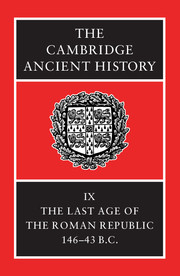1 - The Crisis of the Republic: Sources and Source-Problems
Published online by Cambridge University Press: 28 March 2008
Summary
By the end of the second century before Christ the Romans faced a crisis as a result of their mastery of the Mediterranean, which was made sharper by an increased political awareness resulting from their wider experience and the intellectual contacts made during the acquisition of empire. What Floras regarded as the robust maturity of Rome, which was doomed to collapse into the senility of the Principate, is made a more complex and more rewarding study by Roman self-consciousness. The most penetrating assessment of the Roman rise to power before 150 B.C. was made by Polybius — a Greek familiar with Rome but still an outsider. The Roman histories which had begun to be written from c. 200 B.C. onwards are lost to us but for a few citations and quotations, but, even if they were to be recovered, it is doubtful if we would find anything to compare with Polybius’ analysis. Before the second century had ended, however, not only had the sheer bulk of Roman historical writing increased but the material had become diversified. Sempronius Asellio, who lived in the period of the Gracchi, drew a distinction between writing mere annals, the traditional Roman narrative of events in a strict chronological framework, and histories, which interpreted by seeking causation and motive. In practice this meant that Romans no longer always wrote omnibus narratives stretching from Aeneas, or the wolf and twins, to their own day, but produced monographs on specific topics from the past or present, biographies and autobiographies. Moreover, the development of Roman intellectual life led to other forms of writing in prose – treatises, especially on oratory and law, and letters. Meanwhile, Greek interest in Rome did not cease, and one of the most influential sources for later writers whose native language was Greek was the Stoic philosopher Posidonius, who in addition to works on geography and ethnography wrote a full-scale Roman history which picked up the story where Polybius left it.
The works of the Roman annalists culminated under the emperor Augustus with the work of Livy, 120 of whose 142 books dealt with history down to the death of Cicero. However, the only products actually of the Republican period to survive are two monographs and some substantial fragments of a history by Sallust, one short biography by Cornelius Nepos and the military commentaries of Caesar.
- Type
- Chapter
- Information
- The Cambridge Ancient History , pp. 1 - 15Publisher: Cambridge University PressPrint publication year: 1994



